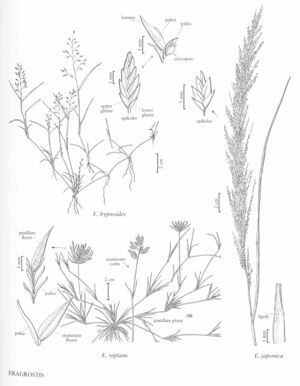Difference between revisions of "Eragrostis hypnoides"
FNA>Volume Importer |
imported>Volume Importer |
||
| (5 intermediate revisions by 2 users not shown) | |||
| Line 7: | Line 7: | ||
|synonyms={{Treatment/ID/Synonym | |synonyms={{Treatment/ID/Synonym | ||
|name=Eragrostis weigeltiana | |name=Eragrostis weigeltiana | ||
| − | |authority= | + | |authority= |
| + | |rank=species | ||
}} | }} | ||
|hierarchy=Poaceae;Poaceae subfam. Chloridoideae;Poaceae tribe Cynodonteae;Eragrostis;Eragrostis hypnoides | |hierarchy=Poaceae;Poaceae subfam. Chloridoideae;Poaceae tribe Cynodonteae;Eragrostis;Eragrostis hypnoides | ||
| Line 19: | Line 20: | ||
-->{{Treatment/Body | -->{{Treatment/Body | ||
| − | |distribution=Minn.;Conn.;N.J.;N.Y.;Wash.;Va.;Wis.;Del.;D.C;Man.;Ont.;Que.;Sask.;W.Va.;Fla.;Wyo.;N.H.;N.Mex.;Tex.;La.;Tenn.;N.C.;S.C.;Pa.;Nev.;Puerto Rico;Colo.;Calif.;Ala.;Kans.;N.Dak.;Nebr.;Okla.;S.Dak.;Ark.;Vt.;Ill.;Ga.;Ind.;Iowa;Idaho;Maine;Md.;Mass.;Ohio;Utah;Mo.;Mich.;Mont.;Miss.;Ky.;Oreg. | + | |distribution=Minn.;Conn.;N.J.;N.Y.;Wash.;Va.;Wis.;Del.;D.C.;Man.;Ont.;Que.;Sask.;W.Va.;Fla.;Wyo.;N.H.;N.Mex.;Tex.;La.;Tenn.;N.C.;S.C.;Pa.;Nev.;Puerto Rico;Colo.;Calif.;Ala.;Kans.;N.Dak.;Nebr.;Okla.;S.Dak.;Ark.;Vt.;Ill.;Ga.;Ind.;Iowa;Idaho;Maine;Md.;Mass.;Ohio;Utah;Mo.;Mich.;Mont.;Miss.;Ky.;Oreg. |
|discussion=<p><i>Eragrostis hypnoides</i> grows along muddy or sandy shores of lakes and rivers and in moist, disturbed sites, at 10-1600 m. It is native to the Americas, extending from southern Canada to Argentina.</p> | |discussion=<p><i>Eragrostis hypnoides</i> grows along muddy or sandy shores of lakes and rivers and in moist, disturbed sites, at 10-1600 m. It is native to the Americas, extending from southern Canada to Argentina.</p> | ||
|tables= | |tables= | ||
| Line 29: | Line 30: | ||
-->{{#Taxon: | -->{{#Taxon: | ||
name=Eragrostis hypnoides | name=Eragrostis hypnoides | ||
| − | |||
|authority=(Lam.) Britton, Sterns & Poggenb. | |authority=(Lam.) Britton, Sterns & Poggenb. | ||
|rank=species | |rank=species | ||
| Line 36: | Line 36: | ||
|basionyms= | |basionyms= | ||
|family=Poaceae | |family=Poaceae | ||
| − | |distribution=Minn.;Conn.;N.J.;N.Y.;Wash.;Va.;Wis.;Del.;D.C;Man.;Ont.;Que.;Sask.;W.Va.;Fla.;Wyo.;N.H.;N.Mex.;Tex.;La.;Tenn.;N.C.;S.C.;Pa.;Nev.;Puerto Rico;Colo.;Calif.;Ala.;Kans.;N.Dak.;Nebr.;Okla.;S.Dak.;Ark.;Vt.;Ill.;Ga.;Ind.;Iowa;Idaho;Maine;Md.;Mass.;Ohio;Utah;Mo.;Mich.;Mont.;Miss.;Ky.;Oreg. | + | |illustrator=Linda A. Vorobik;Cindy Roché |
| + | |illustration copyright=Utah State University | ||
| + | |distribution=Minn.;Conn.;N.J.;N.Y.;Wash.;Va.;Wis.;Del.;D.C.;Man.;Ont.;Que.;Sask.;W.Va.;Fla.;Wyo.;N.H.;N.Mex.;Tex.;La.;Tenn.;N.C.;S.C.;Pa.;Nev.;Puerto Rico;Colo.;Calif.;Ala.;Kans.;N.Dak.;Nebr.;Okla.;S.Dak.;Ark.;Vt.;Ill.;Ga.;Ind.;Iowa;Idaho;Maine;Md.;Mass.;Ohio;Utah;Mo.;Mich.;Mont.;Miss.;Ky.;Oreg. | ||
|reference=None | |reference=None | ||
|publication title= | |publication title= | ||
|publication year= | |publication year= | ||
|special status= | |special status= | ||
| − | |source xml=https:// | + | |source xml=https://bitbucket.org/aafc-mbb/fna-data-curation/src/200273ad09963decb8fc72550212de541d86569d/coarse_grained_fna_xml/V25/V25_111.xml |
|subfamily=Poaceae subfam. Chloridoideae | |subfamily=Poaceae subfam. Chloridoideae | ||
|tribe=Poaceae tribe Cynodonteae | |tribe=Poaceae tribe Cynodonteae | ||
Latest revision as of 17:55, 11 May 2021
Plants annual; stoloniferous, mat-forming, without innova¬tions, without glands. Culms decumbent and rooting at the lower nodes, erect portion (2)5-12(20) cm, often branched, glabrous or hairy on the lower internodes. Sheaths pilose on the margins, collars, and at the apices, hairs 0.1-0.6 mm; ligules 0.3-0.6 mm; blades 0.5-2.5 cm long, 1-2 mm wide, flat to involute, abaxial surfaces glabrous, adaxial surfaces appressed pubescent, hairs about 0.2 mm. Panicles terminal and axillary, 1-3.5 cm long, 0.7-2.5 cm wide, ovate, open to somewhat congested; primary branches 0.1-0.5 cm, appressed to strongly divergent, glabrous; pulvini sparsely pilose or glabrous; pedicels 0.2-1 mm, ciliate. Spikelets 4-13 mm long, 1-1.5 mm wide, linear-oblong, often arcuate, loosely imbricate, greenish-yellow to purplish, with 12-35 florets; disarticulation acropetal, paleas persistent. Glumes linear-lanceolate to lanceolate, hyaline; lower glumes 0.4-0.7 mm; upper glumes 0.8-1.2 mm; lemmas 1.4-2 mm, ovate, strongly 3-veined, veins greenish, apices acuminate; paleas 0.7-1.2 mm, hyaline, keels scabridulous, apices acute to obtuse; anthers 2, 0.2-0.3 mm, brownish. Caryopses 0.3-0.5 mm, ellipsoid, some¬what translucent, light brown. 2n = 20.
Distribution
Minn., Conn., N.J., N.Y., Wash., Va., Wis., Del., D.C., Man., Ont., Que., Sask., W.Va., Fla., Wyo., N.H., N.Mex., Tex., La., Tenn., N.C., S.C., Pa., Nev., Puerto Rico, Colo., Calif., Ala., Kans., N.Dak., Nebr., Okla., S.Dak., Ark., Vt., Ill., Ga., Ind., Iowa, Idaho, Maine, Md., Mass., Ohio, Utah, Mo., Mich., Mont., Miss., Ky., Oreg.
Discussion
Eragrostis hypnoides grows along muddy or sandy shores of lakes and rivers and in moist, disturbed sites, at 10-1600 m. It is native to the Americas, extending from southern Canada to Argentina.
Selected References
None.
